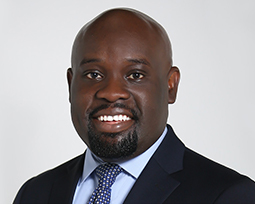
Ikemefuna Okwuwa, M.D.
The following article was originally published by AAFP News. Reprinted with permission.
When Ikemefuna “Ike” Okwuwa, M.D., came to the United States from Nigeria and began his residency in 2009, it didn’t take long for him to put down roots with the Texas Academy of Family Physicians (TAFP).
“I didn’t miss a single meeting as a resident,” he said. “I had to find time because I realized that every time I went there, I drew strength from it. I really value leadership, being able to work with colleagues and building positive relationships with people.”
After completing his training at the family medicine residency at Texas Tech University Health Sciences Center of the Permian Basin in 2012, Okwuwa stayed in Odessa, Texas, as faculty and became the residency’s program director in 2017. Along the way, he’s served the TAFP in a variety of roles and currently is a member of the chapter’s Board of Directors and sits on five of its commissions and committees. He also serves on the Texas Medical Association’s Council on Medical Education.
“This is me,” he said with a laugh. “You do what you love. These are all things that interest me. They are what I am passionate about. If it’s your passion, it doesn’t feel like work.”
Okwuwa said he’s fortunate that his wife, nephrologist Joy Okwuwa, M.D., is his “biggest cheerleader.”
“She’s very supportive,” he said. “You have to try to strike the right work-life balance in everything you do.”
Of all his roles in medicine, Okwuwa said program director has been the most rewarding. The Permian Basin program is one of the largest in Texas, with an approved total complement of 69 residents. The program has six rural training sites in the Permian Basin.
“The rural track residents are able to learn to perform colonoscopies, EGDs, C-sections, nursing home care – whatever the rural docs do,” he said.
That “pluripotent variety” is what drew Okwuwa to family medicine in the first place.
“I always wanted to be able to do as many things as I could as a physician and be of value to my patients,” Okwuwa said. “When you look at all the specialties, family medicine was the one that aligned with what I wanted. It’s a diverse specialty and family doctors are able to make a difference in people’s lives every day. It spoke to me from the get-go, and now I am in a position to shape the future generation in a specialty that I truly believe in.”
Okwuwa, who also serves as an associate professor in the Department of Family Medicine, said he loves developing the next wave of family physicians.
“My goal is to train family medicine physician leaders who are compassionate, competent and bring humanity back into the practice of medicine,” he said.
Okwuwa was recently appointed chair of the AAFP’s Commission on Membership and Member Services.
“Ensuring the value of membership is one of the goals of the AAFP’s Commission on Membership and Member Services,” he said. “Having a passion for building positive relationships, being able to listen and being an advocate that ensures people’s voices are heard are an important part of who I am as a person.”
Okwuwa also has served as a delegate, reference committee chair and international medical graduate constituency co-convener at the AAFP’s National Conference of Constituency Leaders (NCCL). He said leadership development, networking with colleagues and building relationships keep bringing him back.
“People there know where you’re coming from,” Okwuwa said of NCCL, which is an annual leadership development event for women; minorities; new physicians; international medical graduates; and lesbian, gay, bisexual, and transgender physicians or physician allies. “They understand me. It’s fuel for everything you do. You may feel like you are alone in your advocacy efforts, but it is refreshing to see that there are other people like you trying to make a difference. You’re not alone.”
